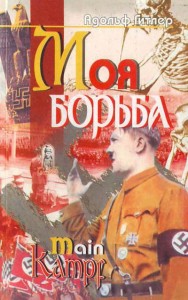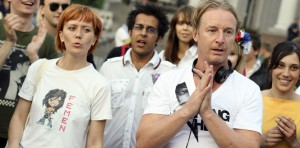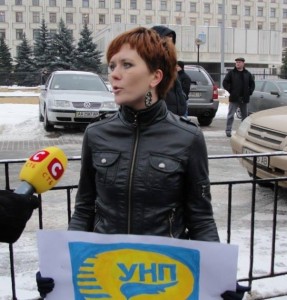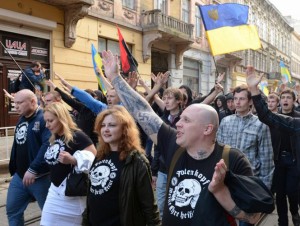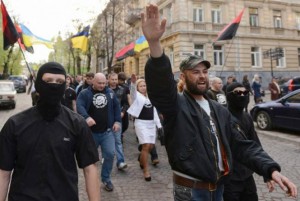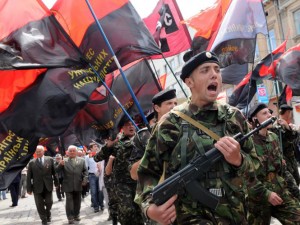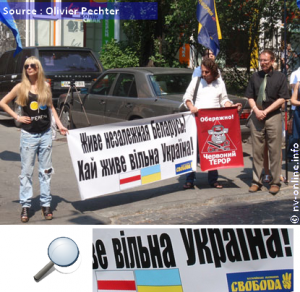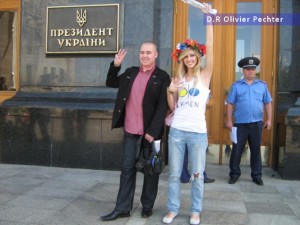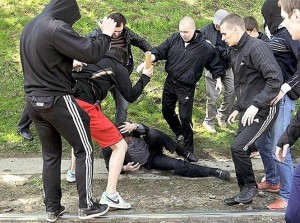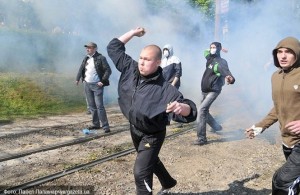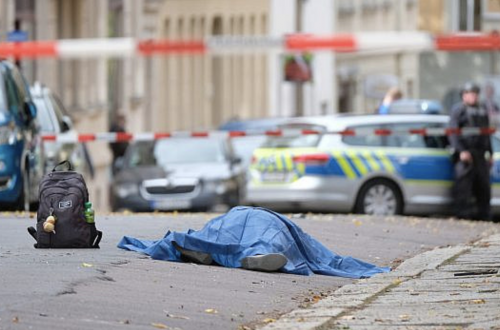Elentir Vigo wrote an article for Spanish website Outono about FEMEN, in which she said:
On September 21st 2010, the Russian website Fishki.net published a report about the daily life of the Ukrainian leaders of Femen. At the time, this extremist group was barely known beyond Ukraine. The report included a series of photos, amongst which was an image where you can see a pile of books owned by Inna Shevchenko, the leader of Femen.
This wouldn’t seem to matter, were it not for a very curious detail.
The book just below the spiral notepad has a name written in Russian Cyrillic script: Адольф Гитлер”, that is, Adolf Hitler. Strange, huh? The book in question is a Russian edition of “Mein Kampf” written by the genocidal Nazi. And an edition with an error in the title – as you can see (spelling it “Main” instead of “Mein”). You can see the relevant edition here:
As a Ukrainian blog drew attention to in 2011, this edition was published in December 2003, and is illegal as it goes against Article 300 of the Ukrainian Penal Code. In fact, in February 2011, 23 copies of this book were confiscated in the city of Kharkov, after the police reported it was being sold. The Ukrainian Attorney-General even opened an investigation into this edition of the odious book.
You could argue that it’s irrelevant for a Femen leader possesses the Nazi manual amongst her (very few) books. However, this ideological affinity run deeper amongst the Ukrainian leaders of Femen.
Take the case of Anna Hutsol, one of the Femen founders in 2008, the redhead who we see in this photo next to the German Helmut Josef Geier (alias DJ Hell), a Femen funder:
This youngster began her political journey amongst Communist ranks, from which she moved into the pan-Slavic Left, joining the Large Ukraine Party to be precise, which unites left-wing economic stances with a strong nationalism and a complete rejection of immigration. During her time in this party, Hutsol would meet Viktor Sviatski, who would go on to set up Femen,(he claimed to have created the group “in order to get women”). This would not be the last party that Femen would be associated with, and neither would it be the most polemical one. On October 22nd 2012, a Russian website published this photo of Hutsol holding up a placard of Українська Народна Партія (УНП), a small Ukrainian nationalist party.
In order to get a better idea of the ideological views of this party, in 2013 members of УНП took part in a march in memory of the Ukrainian SS “Galichina” division celebrating the 70th anniversary of this Nazi outfit. On a Russian website I found 2 images of the march (you can see more in the link):
No comment needed here…
Hutsol is not the only Femen activist who has publicly supported УНП. In this photo taken in June 2011 and published by French journalist Olivier Pechter, we see more Femen activists with a Belarussian flag next to УНП members (with blue flags) and those from the ultra-nationalist paramilitary group УНА-УНСО (with a red flag):
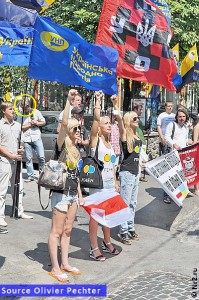
When I say that УНА-УНСО is a “paramilitary” group, I don’t mean this figuratively. Here are two clear signs as to what this group are about, from their “protests”:
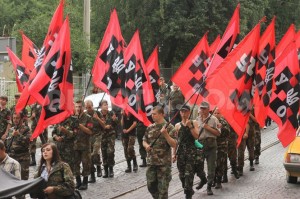
Pechter also published two other key photos about this gathering, in which Femen took part alongside Ukrainian nationalists. In this photo we can see a Femen activist holding up a placard of “Свобода”, another ultra-nationalist and antisemitic Ukrainian party:
“Свобода” was founded in 1991 as “Соціал-національна партія України” (the National-Socialist Party of Ukraine). It had this emblem as its major symbol, an imitation of the “Wolfsangel” used by the Nazis:
In the same June 2011 crowd, just behind Femen women, we see a skinhead:
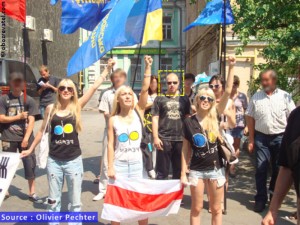
It is none other than Edouard Iholnikov, head of Kiev’s “Свобода” youth movement, according to Pechter. Here we see him in June 2010 next to another Femen leader, Sasha Shevchenko:
And here we can see two photos taken on May 9th 2011 (one month before the aforementioned march), published by the Russian blog Essauty, ein which we see Iholnikov kicking someone on the ground and throwing a stone, next to other Ukrainian ultra-nationalists:
In view of things like those cited above, the actions of these feminazis start to make sense; consider the complaint organised by Femen in front of the SBU – the Ukrainian Secret Service- against Hasidic Jewish pilgrims from Albania who came to Ukraine in September 2009, who were celebrating Rosh Hashaná, the Jewish New Year.
Their letter defamed the Jews by saying that the pilgrims “demonstrate a total contempt for local traditions,” stressing that “anyone trying to undermine our culture should be arrested” – very cynical statements if we bear in mind that they are issued by a group linked to profaning churches and gratuitously offending believers ( to the point that Inna Shevchenko knocked over a cross in memory to the victims of Stalin in 2012 with the aim of outraging Christians). We should not forget their slander against pilgrims of the most purely antisemitic variety,accusing them of harrassment, aggression and even rape, of drinking too much and going with prostitutes. The Femen slanders were spread by the local press, which nevertheless failed to pick up the feminazi group’s retraction on 22nd September, recognising that their accusations were untrue, according to the Euro-Asian Jewish Congress.
Taking all this into account, we have to ask ourselves why Femen does not do the little anti-Nazi number it did last year in Paris. Is it because they fear their friends such as Iholnikov and others would take it badly?


